- Home
- Francine Rivers
Her Daughter's Dream Page 9
Her Daughter's Dream Read online
Page 9
The whole family went to church Sunday morning. Charlie wore his uniform. He looked every inch the Marine, fit and confident. Rev. Elias announced to the congregation that Charlie was going to Vietnam. People swarmed Charlie after the service. Everyone said they would be praying for him.
Carolyn decided to skip Monday classes and stay home another day. Surprisingly, Mom and Dad didn’t quibble. Dad pulled out the slide projector, and they enjoyed pictures of trips to the beach and Colorado. That night, Carolyn dreamed of Charlie in dress blues standing in a field of white crosses. Awakening abruptly, she prayed it wasn’t a premonition.
Before leaving on Tuesday morning, she went over to say good-bye to Oma. They talked briefly about Chel. “That girl is headed for trouble.”
“You heard her story, Oma. Despite all the money, she hasn’t had an easy time of it.”
“She can use her parents as an excuse to ruin her life or as a reason to do better. It’s up to her.”
“Is that why you shared so much of your life story with her?”
Oma tipped Carolyn’s chin. “You’d better watch out for yourself, Liebling. If you don’t decide for yourself what you want from life, someone will do it for you. And you may not like the result.”
Carolyn thought that over as Charlie drove her back to Berkeley. They talked about Chel on the way. Carolyn abruptly changed the subject. “I hate the war, Charlie. I’m protesting it.”
His knuckles whitened on the steering wheel. “If Dad hadn’t fought, where would we be now?”
“We’re not talking about World War II and the Nazis.”
“We can’t all stay home hoping things will turn out right.”
“Vietnam isn’t our country.”
“We can’t turn our backs on what’s happening in the world, Carolyn.”
“I don’t care what happens to the world! I care about what happens to my brother. I’m going to do everything I can to get you back home.”
They didn’t say anything more until he pulled up in front of the apartment house. He tugged her hair. “Don’t become a radical.”
“Don’t be a hero!” She burst into tears.
He gathered her into his arms. His voice choked as he tried to reassure her he’d come back in one piece. He set her away from him and got out of the car. He opened the trunk and took out her backpack. Leaning down, he kissed her cheek. “Try to behave yourself.”
Smile dying, he looked at the door into the building. “Tell Chel I’ll write.”
* * *
Mom and Dad continued to pay college expenses, adding fifty dollars a month so Carolyn could pay her share of the rent on the apartment. When her grades dropped, they suggested she move back into the dorm. Chel said she wasn’t going back and have an RM breathing down her neck, telling her what hours she had to be in bed. But she agreed the apartment might not be such a good idea. Too many parties going on. She found a small, run-down American bungalow, furnished and within walking distance of the university, and talked Carolyn into moving in with her.
Carolyn sent her parents a change-of-address card and the new telephone number. Mom called and sounded furious. “We’re not sending rent for a house, Carolyn. We can’t afford it.”
“You can keep your money. Chel and I have it all worked out.”
“Worked out? How? She pays for everything?”
“I might quit school. Get a job. Protest the war.”
“For heaven’s sake, Carolyn. Don’t start rebelling now. We have enough to worry about with Charlie in Vietnam.”
“Which is precisely why protests are more important than classes!”
“Charlie believes in what he’s doing! Your father’s a veteran. How dare you speak against them! If you’re going to turn into some kind of hippy, don’t expect us to pay for it!” She hung up.
Carolyn held the receiver in her hand. She protested the war, not Charlie. And definitely not Dad. When had she ever said anything against her father’s service? The hurt rose up, gripping her by the throat; and then the anger came, blistering hot, defiant. She slammed the receiver down and went into the kitchen to pour a glass of red wine. When the telephone rang again, she knew it was her mother calling back. She probably wanted to lay down more laws, make more demands, throw around more threats to make Carolyn conform.
Shaking, Carolyn downed the wine like medicine and let the phone ring.
11
1967
The small house became a gathering place for anyone disenchanted with the system. Carolyn went to classes when she didn’t have other things to do, like canvassing the neighborhoods for signatures on petitions to stop the war, or attending protest rallies or giving blood.
As the fighting intensified in Vietnam, Carolyn grew more distracted. She flunked her midterms and stopped going to classes. She worried about Charlie all the time. She couldn’t sleep. Chel encouraged her to smoke pot, but that didn’t help either. Only alcohol worked, when she drank enough of it.
Mom called again. “Come home.”
“You can’t tell me what to do.”
“Have you been drinking?”
She hadn’t slept the night before, and her head felt like cotton. “What’s it to you what I do?”
“Charlie would be ashamed of you!”
The words cut deeper than if her mother had wielded a butcher knife. Charlie had gotten drunk a few times after football games in high school. If Mom and Dad ever knew about it, they never said so. “I’m trying to stop the war! I’m trying to bring him home! But I guess that counts for nothing in your book! If you want to know the truth, Mom, you and Dad sent Charlie to Vietnam. All your talk of God and country.”
“Stop it!”
This time, Carolyn hung up.
Dad called a few hours later. Chel answered and held out the telephone. “It’s your father.” Carolyn took the receiver and slammed it down.
When a letter arrived from Oma, Carolyn dreaded opening it. When she read it, she found no mention of Mom and Dad other than the usual “working hard.” Oma went on about books she had read, the garden, and missing Carolyn every afternoon when she sat down to tea.
I hope you can make it home soon. I miss you.
She must be the only one. Carolyn wrote back.
Dear Oma,
I can’t come home right now. I’m collecting signatures on a petition to end the war. Chel is writing for an underground press, sharing intelligence on how to protest the war more effectively. No one seems to be listening now, but I have hope that change will come. There are plans to march on Washington, and many of us are sending letters on alternative service for conscientious objectors. Several of our friends burned their draft cards. A few are talking about moving to Canada. . . .
Carolyn thought she’d write back and argue.
Mom wrote and asked if she was coming home for Thanksgiving. Carolyn didn’t answer. Mom wrote again a few weeks later and invited her home for Christmas.
Carolyn couldn’t face them. She felt ashamed of her behavior, but also somewhat self-righteous as well. They didn’t understand her, and with Charlie off in Vietnam, she wouldn’t have an interpreter. She didn’t want to face their disapproval and submit to endless lectures about her political views, her loss of faith, or whatever else they would find to criticize. She couldn’t stand seeing them sitting in front of their television set, listening to the news reports and body counts. She didn’t want to watch them worry and then have them take it out on her. She was doing everything she could to end the war and make a better world for all of them!
She wrote home and said she and Chel planned to go skiing in Tahoe. They had talked about it, so it technically wasn’t a lie. They went to San Francisco, instead, the new happening place in America, and spent the night partying at a house in Haight-Ashbury. Cold as it was, they put flowers in their hair and danced in the streets to guitar music and bongo drums.
When they got back to the Berkeley bungalow, Carolyn had two Christmas cards, one from Mom and
Dad with fifty dollars in it, and another from Oma with only a note.
Trust in the Lord with all your heart. Don’t lean on your own understanding. Acknowledge Him in all your ways and He will make your path straight. Proverbs 3:5-6. Live by it and you’ll have no regrets. I love you, Liebling.
Oma
Carolyn felt a sharp pang of guilt, realizing she hadn’t sent a card to anyone, not even Charlie.
She wrote back.
God is dead, Oma. If He loved us, we wouldn’t have wars and famines. People wouldn’t die of disease or be born with deformities or mentally retarded. I don’t believe in God anymore.
She sent it before she could change her mind and then felt eaten up by guilt, ashamed that she’d lashed out at Oma, who’d always loved her unconditionally.
* * *
1968
January blew cold and brought with it the Chinese Lunar New Year. While the Vietnamese celebrated Tet, the Vietcong and North Vietnamese army overran the city of Hue. Chel had bought a television, and a dozen friends and strangers were packed into their living room, high on pot and angst, watching buildings explode and wounded American soldiers carried out on stretchers. Conversation buzzed around Carolyn, but she felt cold inside. Was Charlie among the Marines trying to retake the city? She wanted to scream. Shut up! My brother is in the middle of hell, and if you call him a baby killer or warmonger again, I’ll kill you. Maybe she did say it. It got quiet in the room.
“What’s with her?” someone muttered angrily.
“Jesus . . . Jesus . . . ,” Carolyn prayed, trying to grasp hold of faith again, a last-ditch effort to save Charlie. Please, God, don’t let him get killed. Drunk, she pressed her hands against the television screen. She felt someone’s arms around her.
“Easy, babe. He’ll be okay, Caro. You gotta believe. He’ll be okay.”
Believe in what? God? They’d all been saying God didn’t care or God was dead. When had faith ever been enough?
Carolyn didn’t go to work. She sat glued to the television, searching faces, drinking, looking for Charlie on the screen.
Oma called. “Two soldiers are with your mom and dad.” She spoke Carolyn’s name, but couldn’t get any more out.
Something cracked inside Carolyn. She fumbled the telephone back into the cradle. Her body started to shake violently. The phone rang again. Carolyn heard it from a distance. Another sound intruded, a terrible sound, like a wounded animal screaming in pain. She covered her ears, trying to block it out. Charlie! It was Charlie!
Chel came out of the bedroom, half-dressed, hair in disarray. She grabbed Carolyn’s wrists and pulled her arms down. When the sound grew louder, Chel slapped her across the face. The screaming stopped. Carolyn sat silent, stunned. Chel cupped her face. “Charlie?” Unable to speak, Carolyn crumpled. Hands spread on the bare wood floor, she sobbed.
Uttering a sobbing cry, Chel rose. She screamed a string of curses. When the telephone rang again, she grabbed the cord and yanked it out of the wall. Snatching up the telephone, she hurled it through a window. Hunkering down again, she grabbed Carolyn’s shoulders and shook her. “Caro. Caro!”
The radio played an Animals song. “We gotta get out of this place if it’s the last thing we ever do. . . .”
“I tried so hard, Chel. And I couldn’t save him.”
Chel got dressed, then lit a roach with shaking hands. She pulled Carolyn up with one hand and offered her the rolled marijuana. “Take a drag, Caro. Come on, babe. It’s better than barbiturates.”
Carolyn filled her lungs with pot smoke. She didn’t want to feel anything. The music kept playing its siren song. “We gotta get out of this place . . .” Too late. Too late.
Chel dragged her up. “Let’s get outta here.”
They didn’t pack anything. They left it all behind. The last thing Carolyn remembered was riding across the Bay Bridge in the front seat of Chel’s red Camaro, Janis Joplin screaming, Chel screaming along with her, tears running down her white face.
Oh, Rosie, where do I begin? Charlie is dead, killed in Vietnam, and my sweet Carolyn has disappeared. The pain is too deep for tears. Hildemara can’t eat or sleep; she cries all the time. I fear for her health. I fear for Carolyn as well. God alone knows where she is and what she’s doing to herself. Will I lose everyone I love?
Ever since Charlie joined the Marines, the family has been in conflict. Carolyn has set herself against the war, and unwittingly against Trip. He says anyone against the war is against Charlie and every other young American boy fighting this war. Carolyn says she’d do anything to bring Charlie home, but Trip says the protests are aiding the enemy and demoralizing the troops. Trip called her a traitor and said Charlie would be ashamed of her. She withdrew from the university to devote herself to the antiwar movement, and she has no job, no means of support other than her rich, abandoned friend Rachel Altman. I’ve never met a more damaged girl.
Soldiers came to the house. Hildemara and Trip didn’t want to call Carolyn the first day, but I called her. She hung up without saying a word, Rosie, and when I called back, she didn’t answer. I assumed she was coming straight home to be with her family. She adored her brother. Charlie meant everything to her.
She never showed up. I drove to Berkeley the next day to bring her home. The house was in disarray, the telephone connection ripped from the wall, the television and several windows smashed.
I can’t tell Hildemara or Trip I called Carolyn. They’d believe she didn’t care enough to come home. I know the child is broken and grieving. I don’t know how to find my granddaughter. I lie awake at night and I pray. When I sleep, I dream of Elise.
God knows where Carolyn is, and I pray for His mercy on all of us. I don’t know what else to do.
12
1970
The Summer of Love had ended by the time Carolyn ran away to Haight-Ashbury with Rachel Altman after Charlie’s death. Things had already begun to change. Pot still reigned, but harder drugs rose in popularity. Guru psychologist Timothy Leary advocated acid to expand the mind, but after one bad trip that left Carolyn with residual hallucinations for weeks, she made alcohol and pot her drugs of choice. She spent days in a blur, drinking liberal amounts of wine, red or white, trying to drown her grief, wash away the anger, and stop the nightmares of running through a jungle with her brother.
Chel continued to foot the bill for the two of them, in addition to a succession of hangers-on and groupies who came and went from the house they shared, many of them young men. Chel began to be haunted by hallucinations from dropping too much acid. Sobbing, she’d beg, “I need you, Caro. I need you sober.” Carolyn tried, but craved alcohol like water. They tried to lean on one another, but it didn’t help that everyone around them still used.
When the hallucinations finally stopped, they went outside and sat on the steps. Feeling the sunshine, they went to Golden Gate Park for the first time in weeks. “You’ve been there for me every time I’ve needed you, Caro, even when I didn’t know what I was doing. You drove me clear across the country after Woodstock, when I couldn’t have told you my name, let alone my address. We couldn’t save Charlie, but you saved me. And what have I done for you?”
“You’ve been my friend.”
“What sort of a friend am I?”
“You helped me after Charlie died.”
“I should’ve left you in Berkeley. Your parents would have come and taken you home.”
“No, they wouldn’t.”
“Oma, then.”
Carolyn shook her head. “This is where I belong.”
They found a park bench and sat. Chel put her head in her hands. “Sometimes I just want to call it quits.” She gave a bleak laugh. “I’m sick and tired of being sick and tired. I’m tired of fighting a losing battle.” She leaned back, hands limp in her lap. “I scare myself sometimes, Caro.” She gave Carolyn a sad smile. “I don’t think we’ve been good for each other.”
Hurt, Carolyn couldn’t look at her. “Am I going t
o lose you, too, Chel?”
“I love you, babe.” Chel raised her hand in a halfhearted gesture. “See that family over there?” Her voice turned mocking. “Mommy laying out the picnic lunch while Daughter dear plays with her dolly and Daddy helps Sonny boy fly a kite? Makes a nice Hallmark card, don’t you think?” Her voice choked off. She let out her breath slowly. “What do we have, Caro?”
“Our friendship.”
Chel looked at her then, eyes clear for a change, wet. She looked away again. They didn’t talk for a long while. “I called my father.”
Surprised, Carolyn stared at her. “When?”
“A week ago. Apparently, he dumped my mother last year and married his secretary. According to the new one, he’s off on a honeymoon in Madrid.”
“Where’s your mother?”
“She lives in Paris. Plays in Monte Carlo. Who knows? The new secretary didn’t have her telephone number, or she had orders not to give it to me. She said my father wanted to invite me to the wedding, but didn’t know how to reach me.” She gave a harsh laugh. “All he had to do was follow the money. He just didn’t care enough.”
“Maybe he figured you wouldn’t want to come.”
“Maybe. But it would’ve been nice to have the opportunity to tell him off one last time.” She looked at Carolyn, eyes dark with pain. “Get this. I told that secretary I needed to talk to my father. She asked me if it was an emergency. I told her it was. She said, ‘Give me your number, and I’ll let Mr. Altman know you called.’ I haven’t heard from him yet.”
“Maybe she forgot.”

 An Echo in the Darkness
An Echo in the Darkness A Lineage of Grace
A Lineage of Grace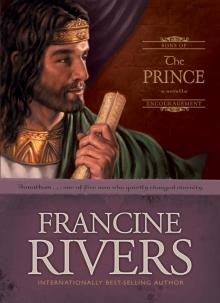 The Prince: Jonathan
The Prince: Jonathan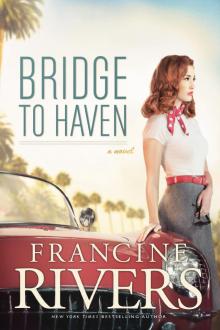 Bridge to Haven
Bridge to Haven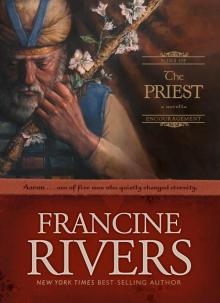 The Priest: Aaron
The Priest: Aaron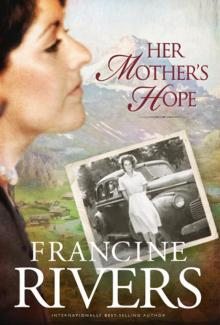 Her Mother's Hope
Her Mother's Hope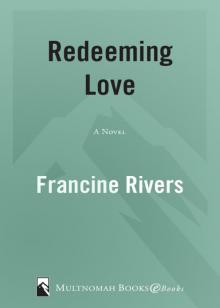 Redeeming Love
Redeeming Love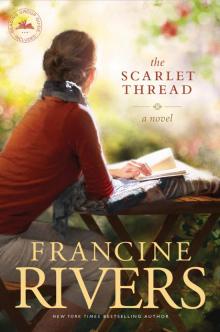 The Scarlet Thread
The Scarlet Thread The Masterpiece
The Masterpiece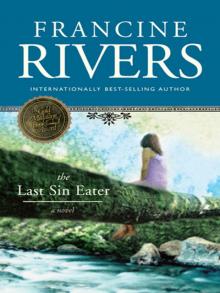 The Last Sin Eater
The Last Sin Eater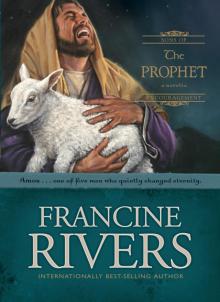 The Prophet: Amos
The Prophet: Amos As Sure as the Dawn
As Sure as the Dawn Her Daughter's Dream
Her Daughter's Dream A Voice in the Wind
A Voice in the Wind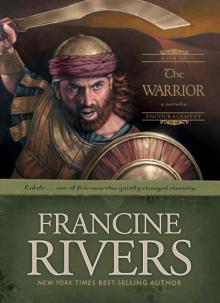 The Warrior: Caleb
The Warrior: Caleb The Scribe: Silas
The Scribe: Silas And the Shofar Blew
And the Shofar Blew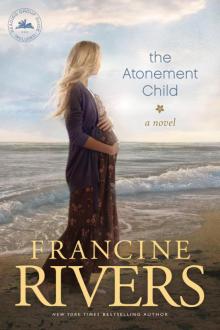 The Atonement Child
The Atonement Child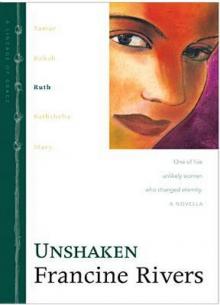 Unshaken_Ruth
Unshaken_Ruth Unspoken_Bathsheba
Unspoken_Bathsheba The Scribe
The Scribe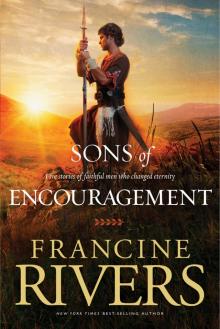 Sons of Encouragement
Sons of Encouragement The Shoe Box
The Shoe Box Sycamore Hill
Sycamore Hill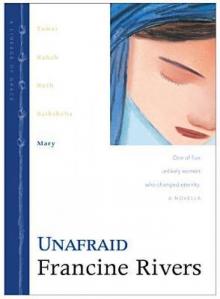 Unafraid_Mary
Unafraid_Mary Marta's Legacy Collection
Marta's Legacy Collection